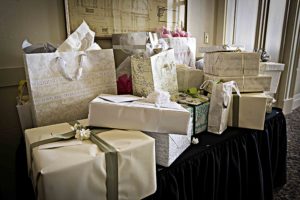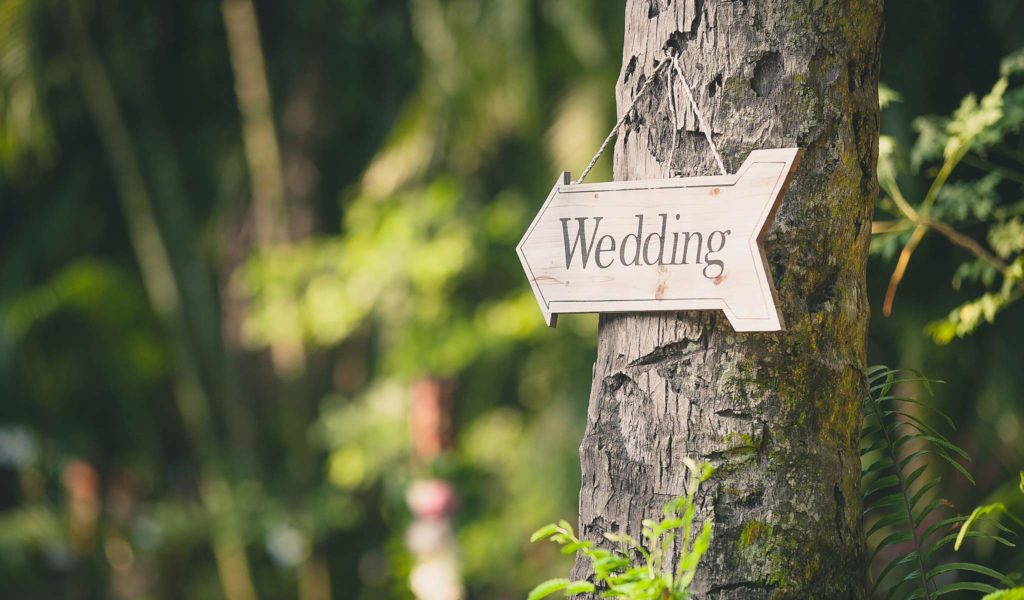A zero-waste wedding might not be at the top of your to-do list when you decide to start planning your big day, however, for any sustainability-minded couples thinking about tying the knot, it’s a great way to start your zero-waste journey together. The good news is while everyone knows that wedding planning is a big job, it doesn’t mean it has to be big on waste!
 The average US wedding produces a massive 400 pounds of garbage and 63 tons of CO2. If your guest list is over 100, your carbon footprint could be much, much higher, and in most cases, the waste generated won’t be biodegradable. That means your decorations, single-use cutlery, and plastic cups will still be here when your great-great-great-great-great-great-great grandchildren are thinking about their wedding decor!
The average US wedding produces a massive 400 pounds of garbage and 63 tons of CO2. If your guest list is over 100, your carbon footprint could be much, much higher, and in most cases, the waste generated won’t be biodegradable. That means your decorations, single-use cutlery, and plastic cups will still be here when your great-great-great-great-great-great-great grandchildren are thinking about their wedding decor!
Today, however, it’s becoming increasingly common for couples to opt for more eco-friendly weddings. Sustainable weddings can help mitigate your carbon footprint and reduce all types of waste materials, and a zero-waste approach is an excellent framework on which to build. As the name suggests, the goal of a zero-waste wedding is to produce no waste whatsoever. In fact, the perfect zero-waste ceremony would be to leave no impact on the environment at all.
To help turn that white wedding into a green wedding, we’ve put together a few of our favorite zero-waste wedding ideas to get you started.
 Hire a Zero-Waste Wedding Planner
Hire a Zero-Waste Wedding Planner
Much like any other type of event, achieving a zero-waste wedding – or even coming close – takes a lot of thought and planning. If you and your other half have decided it’s just your vows you want to last forever and not the decorations, you’ll need to come up with some creative and innovative ideas for your special day.
If your budget allows, consider hiring a zero-waste wedding planner. They’ll be able to help you find zero-waste wedding vendors, suppliers, and caterers, and give you expert advice on how to keep consumption to an absolute minimum. They may also be able to advise you on DIY wedding ideas that can help you keep both costs and waste down.
 Keep Your Zero-Waste Wedding List Small
Keep Your Zero-Waste Wedding List Small
Whether you’re running a business, organizing a household, or planning a wedding, the key to minimizing waste is often to keep things simple. The smaller your guest list, the smaller your carbon footprint will be. A small guest list will also help to better plan catering, favors, and décor, as well as implement low-waste solutions that may not be possible with a larger wedding party.
 Avoid Physical Invites
Avoid Physical Invites
Before you make the journey to your local printers to order invites, consider whether paper invitations are really necessary. If you don’t have your heart set on special stationery, you can cut your waste down to zero by opting for paperless email invites instead.
If you don’t want to forgo wedding invitations altogether, source products that are made from recycled paper and can be recycled themselves. Alternatively, you can choose invitations that have seeds embedded into the paper itself. When guests receive their invite – and once they’ve written down all the most important information – they can plant their invitation and watch the flowers grow. There’s a growing market in zero-waste wedding cards, so finding something suitable should be easy.
 Choose Your Venue Wisely
Choose Your Venue Wisely
The venue you choose will have a big impact on the amount of waste you produce on your big day, and finding a space that will help you reduce, reuse, and recycle can make a big difference at the end of the night! When talking to a prospective venue, tell them that you’re going for a zero-waste wedding. They may have suggestions on how to implement your vision and keep waste to a minimum.
Another important consideration is to select a venue that’s within easy reach of as many of your guests as possible. The less people have to travel, the lower their travel-related emissions will be. Even a non-destination wedding produces around 43 tons of carbon in transportation alone. Leaving international, or out-of-state, guests off the in-person invite list will also help to minimize your environmental impact. Consider live streaming your wedding to those who are further away.
Finally, if you choose somewhere that’s naturally attractive, you won’t have to use as many decorations to get it ready for your celebration. Outdoor venues are ideal for this, and you won’t have to hire a florist to enjoy beautiful flora on the day.
 Zero-Waste Wedding Registry
Zero-Waste Wedding Registry
Unless you and your other half are in need of new cookware, appliances, bedding, or furnishings, it’s a good idea to give the wedding registry a miss. Truly zero-waste wedding gifts are hard to find and listing out stuff you don’t necessarily need is inherently wasteful. Forgoing presents altogether will help to prevent any unnecessary waste. It also gives you a great excuse to avoid packing your home full of unwanted items from well-meaning relatives.
Instead of signing up to a registry, open a bank account and ask guests to offer monetary gifts. Better still, select an environmental charity and get your nearest and dearest to donate on your behalf—your beautiful wedding doesn’t have to be ruled by consumerism, and diverting gifts to those in need is a conscientious way to begin your life together.

Zero-Waste Wedding Favors
You can make your zero-waste wedding even more worthwhile by making guests aware of the importance of a truly environmental approach. An easy way to do this is to give them zero-waste themed wedding favors. Create little goodie bags filled with zero-waste products. This could include things like bamboo straws, shampoo bars, and lip balm. If you like, you can also include a note outlining zero-waste principles and why they’re important to you.
Education is a huge part of the zero-waste concept and using your big day to spread the word is an easy way to help your guests take more from your wedding reception than memories. Be proud of your zero-waste commitment and help others start their own journey at the same time.
 Zero-Waste Wedding Dress
Zero-Waste Wedding Dress
The best way to make your wedding dress zero-waste is to rent a gown for your big day. Wearing a dress that can be worn again and again by other brides will help to dramatically cut your carbon footprint and ensure no materials are consumed in the manufacture of an outfit that will only be worn once. You can do the same for your bridesmaids too and promote this approach across your entire guest list.
If you don’t like the idea of giving your gown back at the end of the day, buy a dress that’s second hand or made from recycled materials. A lot of wedding boutiques and tailors will make alterations and add bespoke features to pre-loved dresses. This can be a good way to stamp your individual style on your outfit.
 Zero-Waste Wedding Decorations
Zero-Waste Wedding Decorations
Decorations contribute a lot to the amount of waste generated on a wedding day. This is especially true if disposable plastic or non-recyclable products are used.
Instead of balloons, ribbon, and other non-biodegradable decorations, choose dried flowers, foliage, paper decorations, and anything else that is compostable at the end of the day. Another good idea is to use live plants. Guests can take these home to plant when the wedding event is over.
If you want to create zero-waste wedding centerpieces, use dried or preserved flowers instead of fresh-cut stems. These reusable blooms can be donated to local care-homes or hospitals or given to guests to take home as a memento. Using dried or preserved flowers in the bouquet – or carrying a live plant down the aisle – will further help to keep any waste produced at your wedding to a minimum.
 Zero-Waste Wedding Food
Zero-Waste Wedding Food
Food waste is a huge problem across the US and the world, and weddings can be notoriously wasteful, with a lot of uneaten meals sent straight to landfill. Plan your wedding meal with this in mind, and carefully estimate the amount of food you need to reduce waste. Going 100% vegetarian can make a bit difference on your carbon footprint too, while making sure your wedding cake is not too extravagant will ensure everyone gets a piece but the remaining isn’t thrown away.
Of course, some leftover food is almost inevitable, so composting any organic matter after the big day is the next best solution. Again, speak to the venue about its composting facilities, or alternatively, find a local farmer who is willing to take it off your hands. Finally, make sure you’re providing cloth napkins, place settings, and tablecloths at the event to ensure they can be reused and not disposed of.
To learn more about going zero waste or to browse our range of ethically sourced zero-waste products, explore the website today. Additionally, subscribe to zerowaste.com or speak to one of our TRUE advisors to discover how you and your business can start your zero-waste journey today.

